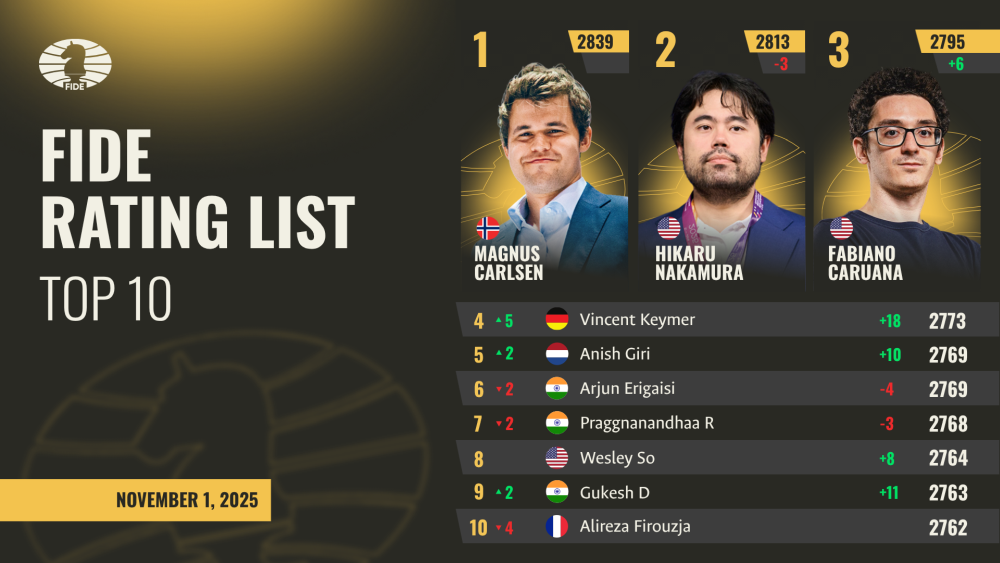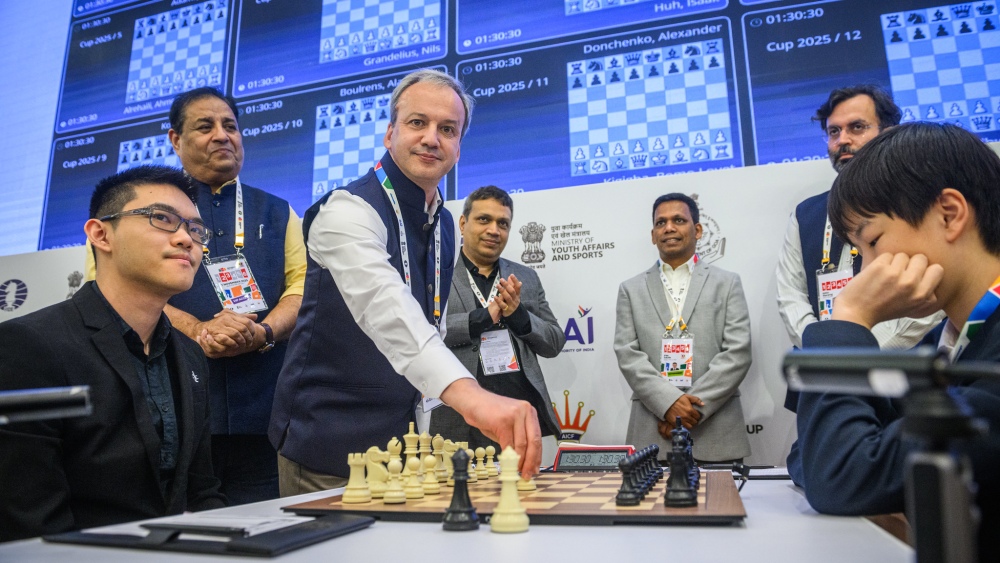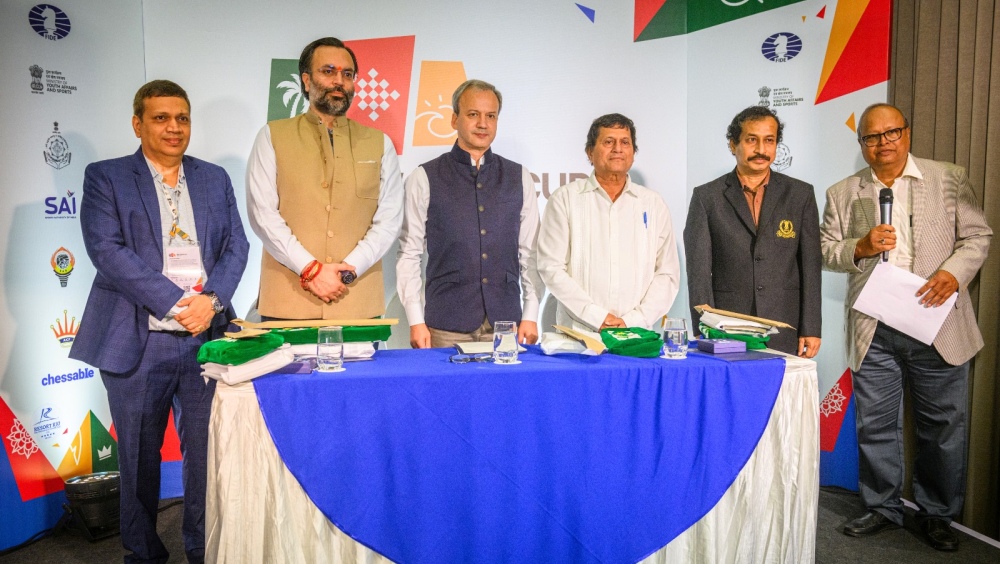Vincent Keymer and Anish Giri enter top 5 Open in FIDE November 2025 rating list

The FIDE November 2025 rating list was primarily shaped by two major team events: the European Team Championship in Batumi, Georgia, and the European Club Cup in Rhodes, Greece (both Open and Women’s sections). While the Women’s Top 10 remains unchanged, the Open Top 10 saw significant shifts. Vincent Keymer (pictured below) and Anish Giri gained 18 and 10 rating points, respectively, in these competitions—propelling both into the Open Top 5. Keymer makes his debut in this elite group, while Giri returns after an 18-month absence. Fabiano Caruana consolidated his hold on third place following his successful title defense at the U.S. Championship, while reigning World Champion Gukesh D re-entered the Open Top 10 thanks to his standout performance at the 2025 European Club Cup. Photo: Michal Waluzsa Biggest gains in top 10 Open and Women Rakshitta, Ravi WGM IND 2381 (+58) Mkrtchyan, Mariam WIM ARM 2353 (+35) Klek, Hanna Marie WGM GER 2357 (+29) Tsolakidou, Stavroula IM GRE 2479 (+26) Kashlinskaya, Alina IM POL 2475 (+25) Toncheva, Nadya FM BUL 2352 (+20) Keymer, Vincent GM GER 2773 (+18) Badelka, Olga IM AUT 2395 (+18) Anton Guijarro, David GM ESP 2648 (+17) Indjic, Aleksandar GM SRB 2635 (+17) Narva, Mai IM EST 2420 (+17) Rapport, Richard GM HUN 2740 (+16) Ravi Rakshitta (pictured below) delivered an outstanding performance at the White Horse GM Tournament 2025. Her +58-point surge not only earned her the top monthly gain but also marked a triumphant return to the Women’s Top 100 and a career-high 63rd position on the list. Photo: Baku Open Mariam Mkrtchyan, Hanna Marie Klek, and Nadya Toncheva excelled at the European Women’s Team Championship, gaining 35, 29, and 20 rating points respectively. All three have re-entered the Women’s Top 100. Stavroula Tsolakidou (pictured below), Alina Kashlinskaya, and Olga Badelka also overperformed in Batumi, and later added 8, 13, and 5 more points, respectively, following strong showings at the 29th European Club Cup for Women. Photo: Michal Walusza Similarly, Aleksandar Indjić, David Antón Guijarro, and Richard Rapport delivered excellent results in both events, contributing to their rating gains. Mai Narva gained 21 points in Batumi, dropped 4 in Rhodes, but still finished the month with a net +17-point increase.
World Cup 2025 kicks off in Goa: Anand honored, young stars shine

The first game of Round One of the FIDE World Cup began this afternoon at 3:00 PM local time in the Baga Resort Rio’s convention centre in Goa, India. The pristine venue hosted the opening clashes of what promises to be a thrilling month-long event, featuring 206 of the world’s top players battling for three coveted spots in the Candidates Tournament — the final step toward challenging for the World Championship title. The round opened with the traditional ceremonial first move: FIDE President Arkady Dvorkovich played 1.e4 on behalf of GM Jeffery Xiong (USA). AICF President Nitin Narang mirrored the move for GM Pranav V (India). According to tournament regulations, the top 50 seeds are automatically qualify for Round 2, meaning 78 games were contested today. Move of the day One of the first games to conclude in Round 1 featured the sensational Yagiz Kaan Erdogmus, currently rated 2651 and rapidly ascending the world rankings. Born in 2011, the Turkish prodigy is, as of 2025, the youngest grandmaster in the world — and today, he once again demonstrated why. Facing Candidate Master Nagi Abugenda (Libya, 1972), Erdogmus unleashed a brilliant attacking display in an Exchange French Defence. White, already behind in development and with his king stranded in the centre, was caught in the crossfire of a sharp tactical strike. From this moment, Black’s attack erupted with the bold sacrifice 10…Nce5!, forking the queen and bishop. The young grandmaster spent only six minutes calculating the sequence. “I thought this was going to be a long game and that I would win in the endgame,” said Erdogmus afterward. “But then he started to play very aggressively. I think he missed knight e5, and after that he’s just losing.” After 11.dxe5 Nxe5 (another fork), 12.Qxd5 Be6! followed — a developing move that renewed the attack by targeting the overloaded queen. When White retreated with 13.Qe4, Erdogmus continued energetically with 13…f5!, and after 14.Qe3, he had already foreseen the decisive 14…Bd5!, simultaneously attacking the rook on h1 and threatening 15…Nf3+ winning the queen. With no way to parry all the threats, Abugenda resigned a few moves later, conceding victory to the young Turkish star in impressive fashion. On board two, GM Jeffery Xiong (USA, 2648) prevailed in a difficult endgame against CM Li Yiheng (Hong Kong, 1994). Despite the 650-point rating gap, the 12-year-old from Hong Kong played far above his rating, testing the American grandmaster’s technique at every turn. https://www.youtube.com/watch?v=u79ZODb5XFQ In his post-game comments, Xiong praised his young opponent’s resilience and talent: “I wasn’t at all surprised because he is a very young player and, as someone who was already giving GMs a tough fight when I was thirteen years old, I knew going in that he was a prodigy and that I should take it very seriously.” On board three, GM Maxim Rodshtein (Israel, 2647) took the lead in his two-game mini-match against CM Qin Oscar Shu Xuan (New Zealand) with a crisp victory as Black. Rodshtein seized the initiative early, gradually building pressure before launching a decisive kingside attack that left his opponent defenceless. Meanwhile, on board five, England’s former world top-ten player GM Michael Adams (2646) showcased his renowned technical precision. In a queen endgame, Adams converted his outside passed pawn into a new queen, sealing a clinical victory in trademark style. Rounding out the top results, GM Vladislav Artemiev (FIDE, 2637) also outplayed CM Heskiel Ndahangwapo of Namibia, trapping his opponent’s queen in the middlegame — a rare tactical motif at this level, and one that drew murmurs of admiration from spectators following the games online. With so many fascinating games on display, it was impossible not to notice several dazzling moments of creativity. One game, in particular, stood out for its sheer precision and ingenuity. In his encounter with IM Satbek Akhmedinov (Kazakhstan, 2372), GM Pranesh M. (India, 2630) found the only move to force victory in a razor-sharp position. In the position, where 47.Bd4+ would have allowed 47…Qxd4, saving the game, and 47.Rf1 would have fallen to 47…Rxg2+!, Pranesh instead uncorked the spectacular 47.Qg7!! Now the twin threats of 48.Bd4+ and 48.Rc6+ loomed, either of which would have decided the game instantly. Akhmedinov tried to resist with 47…Ra1+, but Pranesh calmly blocked with 48.Rf1+!, picking up the rook on a1 and forcing immediate resignation. Outstanding stuff from the young Indian grandmaster. The World Cup’s opening round once again reminded everyone of its trademark unpredictability, as several underdogs punched above their weight to produce surprises and memorable results. The biggest upset of the day came when Chile’s top player, GM Cristóbal Henríquez Villagra (2605), fell with Black in a tricky rook + bishop vs bishop endgame against IM Agibileg Uurtsaikh (Mongolia, 2448). A handful of grandmasters were unable to break through and had to settle for draws — likely saving their energy and preparation for Game 2. Among them: FM Mohan Kavin (Malaysia, 2346), who held GM Robert Hovhannisyan (Armenia, 2633) to a solid draw. IM Reja Neer Manon (Bangladesh, 2369), who split the point with GM Aryan Tari (Norway, 2631). Another standout performance came from FM Daniel Barrish (South Africa, 2284), who pressed with Black throughout against Goa’s own GM Raunak Sadhwani (2641) before agreeing to a draw after 56 moves — a truly impressive result for the young South African. Last but not least, the only female player in the field, recent Women’s World Cup champion GM Divya Deshmukh (India), was defeated by GM Stamatis Kourkoulos-Arditis (Greece, 2583). Divya showed ambition from the start, sacrificing a pawn in the opening to build attacking chances. However, the compensation never fully materialized. As the game steered into a complex double-rook endgame, time pressure took its toll — one misstep was all it took for the Greek grandmaster to seize control and convert the point. Divya will have another opportunity tomorrow to even the match. https://www.youtube.com/watch?v=3X6iRvyRrrM Asked afterward about the unusual atmosphere created by dozens of cameras and spectators crowding the top boards, Kourkoulos-Arditis smiled: “I’ve never
Pranav Venkatesh, clear winner of the 8th Salamanca Masters

The eighth edition of the ‘Salamanca Cradle of Modern Chess’ Festival paid tribute to the city’s fundamental role in the history of the game. It was here, in 1497, that the student Lucena first compiled the modern rules in his work Arte de ajedrez con 150 juegos de partido. An original copy of this incunabulum is preserved in the University’s Historical Library. The tournament, held from October 22 to 25, featured a double round-robin format with a time control of 30 minutes plus a 5-second increment per move. The competition brought together six outstanding players: Ruslan Ponomariov, Pranav Venkatesh, and Julio Granda in one side, and Sara Khadem, Nadya Toncheva, and Sabrina Vega in the other. Heading into the final day, Pranav, the reigning World Junior Champion, stood as the sole leader with 6.5 points, a half-point ahead of the defending Salamanca champion, Ponomariov. The highlight of the last day was their second encounter in the eighth round (Pranav had won the first with the white pieces). Ponomariov achieved a comfortable advantage, exerting pressure on the Indian GM’s hanging pawns – but a single mistake cost him dearly. With 32.Qa3? (much better was 32.Rdc1! maintaining pressure) White allowed Pranav to launch a powerful counterattack with the thematic pawn thrust 32…d4! which turned the tables. After 33.Bxa8 (33.exd4? Bxg2 34.Kxg2 Qe4+) d3! Black won an exchange. Pranav’s conversion was not flawless – at some point it seemed Ruslan might hold a draw – but in the end, time trouble took its toll. 0-1 With this win Pranav practically secured the prestigious title in Salamanca. The World Junior Champion finished strong with two wins on the final day, scoring 9.5/10 and achieving an impressive performance rating of 2949. Another compelling storyline was the battle was for third place on the podium, which for the first time in the eight tournaments was going to be won by a female player. In the final round the strong Iranian-born player Sara Khadem, who became a Spanish national in 2022, was fighting against the tournament’s revelation, the young Bulgarian Nadya Toncheva. Toncheva emerged victorious, establishing herself as a player to watch closely in the women’s chess. She scored 50% against very strong opposition, a remarkable achievement. The success of this eighth edition—the number 8 being highly symbolic in chess—has been undeniable. The organizers acknowledge the sponsorship of the Salamanca City Council, the University of Salamanca (together with Alumni), and the Regional Government of Castilla y León. Final standings: Pranav V – 9½/10 Ruslan Ponomariov – 8 Nadya Toncheva – 5 Sara Khadem – 3½ Julio Granda – 2½ Sabrina Vega – 1½ Photo: Universidad de Salamanca Official website: salamancachess.com/
Opening ceremony of the 2025 FIDE World Cup dazzles in Goa

The Dr. Shyama Prasad Mukherjee Indoor Stadium in Goa hosted this afternoon the 2.5-hour-long opening ceremony of the 2025 FIDE World Cup, marking the official start of one of the world’s most prestigious chess events. A vibrant mix of India’s leading music and film industry artists delighted an audience of over a thousand players, officials, and guests with a series of breathtaking performances interwoven with inspiring speeches from dignitaries and chess leaders. At 4:30 p.m. sharp, the evening’s presenters welcomed everyone to the ceremony, noting that 206 top players from around the world will compete for the USD 2 million prize fund in what promises to be the toughest intellectual battle ever, focused on strategy, determination, and motivation. After the audience stood for the Indian national anthem, the dignitaries performed the traditional lighting of the lamp a symbolic act representing blessings, greatness, and positivity. The distinguished guests included Dr. Mansukh Mandaviya, Union Minister of Youth Affairs and Sports; Dr. Pramod Sawant, Chief Minister of Goa; Dr. Ramesh Tawadkar, Minister for Art & Culture, Tribal Welfare and Sports & Youth Affairs of Goa; FIDE President Mr. Arkady Dvorkovich; and AICF President Mr. Nitin Narang. A curtain-raising video followed, celebrating The Spirit and Story of Chess, and concluding with the stirring line: “Where strategy meets spirit and champions are born.” The Hormuzd Khambata dance company then took the stage with a dazzling performance paying tribute to Goan color and culture. Among the evening’s speeches, two stood out. Mr. Nitin Narang, President of the All India Chess Federation, read a recorded message from Prime Minister Narendra Modi, who expressed his hope that the FIDE World Cup would inspire a new generation of players. He emphasized that “the event offers a special opportunity not only to showcase talent but also to motivate the youth ” and with these words, he declared the FIDE World Cup 2025 open. FIDE President Arkady Dvorkovich followed, reminding everyone that the tournament is among the most important and dramatic in the FIDE calendar. Of the 206 players participating, only three will qualify for the 2026 Candidates Tournament, the gateway to the world championship match. Dvorkovich described Goa as “not just a coastal paradise, but the Colosseum of Chess” where legends are forged and new champions born. He concluded by wishing all players good luck and fair play, adding: “While we cannot yet say who will be the winner in Goa, two things are certain: this will be a great event, and the players will experience the full breadth of Indian hospitality, which is difficult to match.” As Dvorkovich ended his remarks, the audience rose for the FIDE anthem, followed by an energetic live performance of The Spirit of Goa by Hema Sardesai and her band. Then came a special moment: GM Divya Deshmukh, the recent 2025 Women’s World Cup Champion and the only female player in this event, joined the presenters on stage to conduct the drawing of lots. By selecting black for Gukesh, the top seed, it was determined that all odd-numbered players will start their first games with the black pieces. Divya shared her excitement: “Playing on home soil and representing India gives me an extra sense of pride and motivation.” A flute and beatbox performance by the Qudrot Duo followed, before the dignitaries reunited on stage to unveil the Viswanathan Anand World Cup Trophy – a magnificent brass and gold-plated creation, symbolizing passion, precision, and performance. A final video screening of the official World Cup song – It’s Your Move – preceded the night’s closing performance by the legendary Usha Uthup band, who brought the house down with powerful renditions including Skyfall from the James Bond film of the same name. Round 1 begins on November 1 at 3 PM local time. The action can be followed live on the FIDE YouTube Channel, featuring expert commentary by GMs Evgenij Miroshnichenko and Jan Gustafsson. To watch the games in person, tickets can be purchased [HERE] Official website: worldcup2025.fide.com/ Written by Michael Rahal Photos: Michal Walusza
FIDE, AICF and KIIT University sign landmark MoU to promote chess in education and society

Goa, India — October 31, 2025 A new chapter for chess and education was written this morning at the Hotel Rio Resort in Goa, India, where the International Chess Federation (FIDE), the All India Chess Federation (AICF), and KIIT University officially signed a Memorandum of Understanding (MoU) to promote the values of chess in education and society across India, Asia, and the world. The signing took place just hours before the opening of the 2025 FIDE World Cup, highlighting the shared commitment of all parties to use chess as a tool for learning, inclusion, and personal growth. President Arkady Dvorkovich, representing FIDE; President Nitin Narang, representing the AICF; and Dr. Achyuta Samanta, Founder of KIIT and KISS Universities and Member of Parliament, signed the MoU in a ceremony attended by chess officials, educators, and media representatives. The agreement establishes a framework for cooperation through 2025 and 2026, focusing on joint initiatives such as training programs, workshops, conferences, research, case studies, school competitions, and awareness campaigns. The collaboration also aims to enhance teacher training and develop educational programs that bring chess into classrooms and communities — beginning in India and expanding globally. “We have recently launched the 2026 Year of Chess in Education, following this year’s Year of Social Chess. There is an ongoing effort to fulfill the social mission of our beloved game, and we are delighted to find more and more partners joining us in this endeavor. This Memorandum will help us promote chess in schools and share best practices and knowledge—not only in India but globally,” said Arkady Dvorkovich, President of FIDE. “It’s a proud moment to sign this MoU, with India leading the way in Social Chess. I am confident that AICF, KIIT, and FIDE will make every effort to ensure that every school provides access to chess from an early age,” said Nitin Narang, President of AICF. “We are committed to promoting all forms of sports in India, and our chess programs have been running successfully for many years. I warmly invite everyone to the January conference in the beautiful city of Bhubaneswar, and I hope it will be a great success,” said Dr. Achyuta Samanta, Founder of KIIT and KISS Universities. As part of the agreement, an International Conference on Social Chess and Educational Chess will be held in January 2026 in Bhubaneswar, hosted by KIIT University. This event will form part of FIDE’s global initiatives: the Year of Social Chess 2025 and the Year Chess in Education 2026, bringing together international and Indian experts to explore how chess can foster social inclusion and educational innovation. In closing the ceremony, Arkady Dvorkovich presented KIIT University and the AICF with the Social Chess Years Award Medal, in recognition of their commitment to advancing chess for social good. This landmark collaboration underscores India’s growing leadership in the global chess movement — demonstrating how the game can transform education, empower youth, and connect communities worldwide. About AICF The All India Chess Federation (AICF) is the national governing body for chess in India, overseeing the game’s development and organization from grassroots to elite levels across the country. About KIIT University KIIT (Kalinga Institute of Industrial Technology), based in Bhubaneswar, India, is one of the country’s leading universities, renowned for its commitment to inclusive education, innovation, and social impact through its sister institution, KISS (Kalinga Institute of Social Sciences).
Tickets now on sale for FIDE World Cup 2025!

The wait is over! Tickets are now available for the opening rounds of the FIDE Chess World Cup 2025, taking place in Goa, India from 1 to 26 November 2025. You can now book your seats for the first two rounds (1 to 6 November 2025) and witness world-class chess up close. This year’s World Cup brings together 206 of the world’s best players, competing for a $2 million prize fund and three qualification spots in the FIDE Candidates 2026. Among the stars in action are World Champion Gukesh, Arjun Erigaisi, Praggnanandhaa, Nodirbek Abdusattorov, Anish Giri, Vincent Keymer, and many more. Choose your experience We’ve designed several ticket options to help you enjoy the World Cup in your own way: Playing Hall Ticket:Step into the arena and experience world-class chess up close. You can choose from four time slots to see the action live, including a special Photo Slot that allows limited photography before play begins. Fan Zone Pass:Join live commentary sessions with India’s top chess voices; IM Tania Sachdev, IM Sagar Shah, GM Harshit Raja, GM Sahaj Grover, Amruta Mokal, and Sahil Tickoo. You’ll get to interact with them throughout the day and even meet players who visit the fan zone after their games. Ticket pricing Classical Game Days (1, 2, 4 & 5 November) Playing Hall Tickets: Photo Slot 1 – ₹500 | 2:00 PM (Photography permitted until 3:10 PM) Slot 2 – ₹300 | 4:15 PM Slot 3 – ₹300 | 5:15 PM Slot 4 – ₹300 | 6:15 PM until end of play Fan Zone Ticket: ₹1,000 Full-day access to the Fan Zone Playoff Days (3 & 6 November) Full Day Ticket: ₹800 Grants full-day access to the playoff rounds, where every move could decide a player’s World Cup journey. Fan Zone Ticket: ₹1,000 Full-day access to the Fan Zone Terms and Conditions All ticket purchases are final and non-refundable. Internet handling fees may apply per ticket. Arrive at least 15 minutes before your scheduled time slot. Please do not attend if you feel unwell. Unlawful resale will result in ticket cancellation without refund. Seating is first-come, first-served. Entry to the playing hall is subject to limited capacity. No mobile phones or electronic devices allowed inside (except for Photo Slot 1). Phones must be deposited before entering. Silence must be maintained in the playing hall. Photography is only permitted during Photo Slot 1. Fan Zone Pass grants full-day access. Slot Ticket allows entry only during your chosen time slot Cash-and-carry food counters will be available on-site. The organizer reserves all rights of admission and policy updates. Tickets are limited and selling out quickly, don’t miss your chance to witness the FIDE World Cup 2025 in person. Book your tickets now
ChessMom Project returns for 2026 Chess Olympiad in Uzbekistan

FIDE and the FIDE Commission for Women’s Chess are proud to announce the return of the ChessMom Project for the 46th Chess Olympiad, to be held in Uzbekistan in 2026. This pioneering initiative was first introduced at the 2024 Chess Olympiad in Budapest and received overwhelmingly positive feedback from participants and federations alike. The ChessMom Project reflects FIDE’s commitment to supporting professional women chess players who are mothers, helping them continue their chess careers while caring for their young children. “I think it is important that women in chess feel supported. We cannot take all the barriers for women away, but with programs like ChessMom we want to help professional chess players balance their career and personal life.” — Dana Reizniece, FIDE Deputy Chair of the Management Board The core mission of the project remains unchanged: to ensure that motherhood and a professional chess career can go hand in hand. The program provides financial support for female players with babies, allowing them to travel and compete with the assistance of a caregiver. For the 2026 edition, an important update has been introduced: Mothers with children under two years of age (previously under one) at the time of the Olympiad are now eligible to apply. Key details for the 2026 ChessMom Project FIDE will support 10 female chess players, based on rating (highest to lowest) At least 1 player per Continent in guaranteed FIDE will provide reimbursement up to €1,000 per player (or €500 EUR from same continent as Olympiad host country) who travels with an under 2 years old child, to cover the caregiver’s flight ticket to the 46th Chess Olympiad (most airlines do not charge for child under 2, traveling with an adult) Child and accompanied caregiver shall be considered as part of the National Official Delegation with all applicable rights. Meaning providing lodge and meals, and any other applicable discounted fee as part of the Official Delegation (not visitor) National Federations* should consider child and accompanied caregiver as part of the National Official Delegation with all applicable rights. Application requirements Interested national federations and eligible players are invited to prepare the following information: Player’s full name, FIDE ID, national federation, and citizenship Visa requirement for Uzbekistan Child’s full name and date of birth Accompanying person’s full name, relationship to the player or child, and citizenship Letter of request from the player Letter of concurrence from the National Federation confirming participation in the 2026 Olympiad Further details – including the official application form, timeline, and submission deadlines – will be announced once the official Olympiad regulations are published by the organizers. Note to National Federations National teams participating in Chess Olympiad normally receive three (3) rooms as part of their official accommodation package — typically, two double rooms and one single room for five (5) players. For delegations that include a player approved under the ChessMom Project, the single room will be upgraded to a double room to allow the caregiver and the baby to stay comfortably together with the delegation. It is important to note that this adjustment does not increase the total number of rooms provided to each delegation. The delegation will still receive a total of three rooms, as per standard allocation. Building on the success of 2024 The first edition of ChessMom took place at the 2024 Chess Olympiad in Budapest, where six mothers from across the world received support through the program: Alina Kashlinskaya (Poland), Nana Dzagnidze (Georgia), Yuliia Osmak (Ukraine), Aster Melake Bantiwalu (Ethiopia), Rauha Shipindo (Namibia) and Nolwazi Nkwanyane (Eswatini). Their stories demonstrated that motherhood truly can coexist with continued professional growth. As Namibian player Rauha Shipindo shared: “I am so grateful to those who initiated the ChessMom program. It is trying to close the gap that is there for women. If I have a newborn like this, I might weigh in and say, will I stay to look after my little one, or will I go to the Chess Olympics? So it’s combining that gap and closing it.” Continuing the mission With the 2026 edition, the ChessMom Project continues to break new ground in supporting women in chess. It stands as a symbol of FIDE’s ongoing dedication to equality, inclusion, and respect for the diverse paths that bring players to the chessboard. FIDE and the FIDE Commission for Women’s Chess will work tirelessly to continue this mission. “We are committed to ensuring that no woman is forced to choose between motherhood and her professional career as a chess player. ChessMom continues to grow, raise awareness, and send a message that mothers who play chess are not alone.” — Francisco Javier Cruz Arce, FIDE Women’s Commission Member and Project Initiator More details about the project will be shared soon. For additional information about the project, please contact Francisco Javier Cruz Arce, at fj_007@yahoo.com.
FIDE Al-Ain ACMG Academy launch: A new era of global talent development

The FIDE Trainers’ Commission is delighted to announce the official launch of the FIDE Al-Ain ACMG Academy, scheduled to begin on 1 December 2025. FIDE President Arkady Dvorkovich emphasized that this flagship initiative represents a cornerstone of FIDE’s long-term global strategy to develop young chess talents and ensure that every federation has equal access to world-class instruction. “The FIDE Al-Ain ACMG Academy reflects our vision of a truly global chess community — one where talent, passion, and opportunity meet. By connecting young players with some of the greatest trainers in history, we are building a bridge to the future of chess education and giving every federation the chance to nurture its next generation of champions,” said Dvorkovich. Sheikh Sultan bin Khalifa bin Sultan bin Shakhbout Al Nahyan, President of the Al Ain Chess & Mind Games Club, presented the launch of FIDE Al-Ain ACMG Academy as a project of global importance: “This Academy is more than a training project — it is a dream shared by us and FIDE that every child deserves the chance to learn, dream and become a champion. Together with the FIDE Trainers’ Commission, we are creating a global platform that welcomes every young player, no matter where they come from — to engage in high-level training and learn from some of the greatest minds in chess history.” The Academy brings together a constellation of legendary chess minds — including Hou Yifan, Rustam Kasimdzhanov, Alexander Khalifman, Vladimir Chuchelov, Artur Jussupow, Iossif Dorfman, Adrian Mikhalchishin, Ramesh R B, Vladimir Potkin, Aleksey Dreev, Vladimir Malakhov, Yevgeniy Vladimirov, Melikset Khachiyan, Yannick Gozzoli, Farrukh Amonatov, Alonso Zapata, and other great lecturers to be announced soon — who will deliver a comprehensive 400-hour training program designed to inspire and elevate the next generation of champions. Training will be conducted in twelve specialized groups, across four languages (English, Russian, Spanish, and French), and will run from December 2025 to May 2026. The curriculum blends advanced chess instruction with personal development sessions, emphasizing both intellectual growth and character building. A key highlight of the program will be the FIDE Al-Ain ACMG Academy Training Camp, which will take place in two stages — an online phase followed by an in-person camp in Al-Ain, United Arab Emirates, scheduled for mid-January 2026. Participation in the camp will be determined based on selection criteria to be announced at a later stage. FIDE invites all National Chess Federations to nominate four promising young players — two boys and two girls aged 8 to 16 — to take part in this prestigious program. Nominations should be submitted by completing the [Registration Form] and sending it to trainers@fide.com no later than 14 November 2025. The FIDE Al-Ain ACMG Academy embodies FIDE’s enduring commitment to excellence, inclusivity, and the advancement of chess education worldwide — shaping not only future grandmasters but also future leaders through the universal language of chess. For more details and updates, please visit the FIDE Trainers’ Commission website.
FIDE World Rapid & Blitz Chess Championships 2025: Registration period nearing close

What better way to end the year than with a high-stakes chess tournament featuring the world’s top players, a one-million-euro prize fund, and popular fast-paced time controls? The 2025 FIDE World Rapid & Blitz Championships offer exactly this to chess players and fans around the globe. This year, from December 25-31, the annual event heads to Doha, Qatar – a world-class setting for a world-class competition. Registration is now open, and FIDE invites all eligible players to take part in one of the most exciting events on the chess calendar. [Register now] Event overview Rapid: Open section: 13 Swiss rounds Women’s section: 11 Swiss rounds Blitz: Two-stage format: Swiss stage: 19 rounds (Open), 15 rounds (Women) over two days Knockout stage: Only the top four players from the Swiss stage proceed to the semifinals (Open and Women). Matches in the knockout are over four games, and ties after these lead to a “sudden death” game. Prize fund Open Rapid Championship: €350,000 Open Blitz Championship: €350,000 Women’s Rapid Championship: €150,000 Women’s Blitz Championship: €150,000 Eligibility Players with a FIDE rating of 2550 (Open section) or 2250 (Women’s section) or higher in any recent FIDE rating list (Standard, Rapid, or Blitz) are eligible to participate. Reigning national champions also qualify regardless of rating. Players who do not meet the above criteria may be nominated by the FIDE President and/or the organiser. Registration Entry fee: $100 for the Open section and $50 for the Women’s section. Late entry fee: Double the original fee if paid less than 10 days before the tournament. The list of registered players includes: Open: Gukesh D, Nodirbek Abdusattorov, Levon Aronian, Vasyl Ivanchuk, Arjun Erigaisi, Volodar Murzin, Praggnanandhaa R, Ian Nepomniachtchi, Shakriyar Mamedyarov, Wesley So, Anish Giri, Maxime Vachier-Lagrave. Women: Humpy Koneru, Vaishali R, Zhu Jiner, Lei Tingjie, Bibisara Assaubayeva and Nana Dzagnidze. Travel & accommodation support Open section players rated above 2750 and women’s section players rated above 2500 will have travel and accommodation covered. The 2024 medalists (gold, silver, bronze) will have full accommodation covered. Accompanying person fee: Accompanying person’s fee in amount of 100 USD must be paid by 1 November 2025, which covers: Transportation during the event: airport-hotel-airport, hotel-playing hall-hotel; Accreditation; Visa support; General admission ticket Registration can be done [HERE]. The deadline for submitting entries is November 01, 2025. All foreign players and their accompanying persons shall stay only in the official hotels, which can be booked while completing the registration form. Regulations for 2025 FIDE World Rapid & Blitz Championships: Open (PDF) Women’s (PDF) With exciting formats, strong incentives for top performers, and full global attention, the stage is set in Doha for one of the landmark events of the chess calendar.
Global tech and finance giants qualify for second FIDE World Corporate Chess Championship Finals

Teams from blue-chip companies including Microsoft, Google, JP Morgan, and Deloitte are among the qualifiers for the over-the-board finals, which will take place alongside the World Cup in Goa, India. Following the online qualifications and knockout stages in early to mid-October, FIDE is pleased to announce the qualifiers for the finals of the 2025 FIDE World Corporate Chess Championship. The competition for the title of “The Smartest Company in the World” will see eight teams compete in an over-the-board tournament to be held from November 14 to 16 in Goa, alongside the World Cup. The qualifying stage saw over 30 teams from across the globe compete, with the online stage culminating in a fierce knockout bracket to determine the eight finalists. The inaugural edition of the event, held in New York in June 2024, saw corporate giants such as Google, Deutsche Bank, Goldman Sachs, BlackRock, and UBS in the finals, with Chessify taking the title following a thrilling final against ChessMood. A key feature of this year’s competition is its exclusive focus on fully non-professional corporate players. This strategic decision ensures a true test of business talent and provides a peer-to-peer competition, excluding teams from chess companies or those composed of chess professionals. “We are thrilled that famous world companies have fielded teams in the World Corporate Championship, showing that chess is very much present in the world of business. The World Corporate Championship is not just a competition for the title of The World’s Smartest Company; it is also a mini business forum, allowing professionals from different business backgrounds to connect through the common love for chess,” said Joran Aulin-Jansson, Vice-President of the FIDE Council. “We are excited that the finals are taking place alongside the World Cup in India. We think this is a great opportunity for forging new connections between chess and the business world. Given that India is a booming global economy as well as a chess powerhouse, this seems like an excellent opportunity for all,” he added. For more information about the event, please visit the official website at worldcorporate.fide.com.

